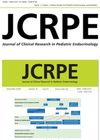 January 2025 in “HORMONES”
January 2025 in “HORMONES” Gender-affirming hormone treatments need better patient-focused outcome measurements and standardized data collection.
February 2024 in “IntechOpen eBooks” Proper nutrition can help manage PCOS symptoms and improve overall health.
[object Object] 
Nanocarriers with plant extracts show promise for safe and effective hair growth treatment.
 September 2023 in “Forum Dermatologicum”
September 2023 in “Forum Dermatologicum” Various treatments for common hair loss in men and women are effective, but should be tailored to individual needs and potential side effects.
 June 2023 in “Stem cell reviews and reports”
June 2023 in “Stem cell reviews and reports” Stem cell therapies could be a promising alternative for hair loss treatment, but more research is needed to understand their full potential and safety.
 May 2023 in “Journal of Clinical Medicine”
May 2023 in “Journal of Clinical Medicine” New understanding and treatments for hair loss are improving, but more research is needed.
 February 2023 in “IntechOpen eBooks”
February 2023 in “IntechOpen eBooks” Testosterone replacement therapy helps manage deficiency and has various methods, but requires careful monitoring to avoid side effects.
January 2022 in “Springer eBooks”  November 2014 in “John Wiley & Sons, Ltd eBooks”
November 2014 in “John Wiley & Sons, Ltd eBooks” Eating high-glycemic and dairy foods can increase hormones that may cause acne and other health issues.
 21 citations,
June 2020 in “Dermatologic Therapy”
21 citations,
June 2020 in “Dermatologic Therapy” The COVID-19 pandemic led to fewer dermatology visits and changed the types of skin conditions patients experienced.
 1 citations,
December 2022 in “Archives of Dermatological Research”
1 citations,
December 2022 in “Archives of Dermatological Research” Acne treatment with isotretinoin increases the presence of p53, a protein, in skin and oil glands, which may help reduce acne severity.
 7 citations,
July 2019 in “International archives of internal medicine”
7 citations,
July 2019 in “International archives of internal medicine” Common skin conditions can greatly affect a person's mental health and social life.
 2 citations,
February 2009 in “Journal of the American Academy of Dermatology”
2 citations,
February 2009 in “Journal of the American Academy of Dermatology” Many research paper titles in dermatology journals lack scientific precision.
 January 2024 in “International Journal of Dermatology Venereology and Leprosy Sciences”
January 2024 in “International Journal of Dermatology Venereology and Leprosy Sciences” Patients with acne vulgaris have lower serum irisin levels.
 18 citations,
March 2014 in “Current Pharmaceutical Biotechnology”
18 citations,
March 2014 in “Current Pharmaceutical Biotechnology” Metformin helps regulate menstrual cycles, induce ovulation, and improve pregnancy outcomes in women with PCOS.
 December 2024 in “Journal of Clinical Research in Pediatric Endocrinology”
December 2024 in “Journal of Clinical Research in Pediatric Endocrinology” 21-hydroxylase deficiency causes hormone imbalances leading to various symptoms, and diagnosis involves clinical and genetic tests.
 29 citations,
January 2007 in “Dermatologic Clinics”
29 citations,
January 2007 in “Dermatologic Clinics” Photodynamic Therapy is an effective treatment for mild to severe acne.
 18 citations,
August 2011 in “Clinical Drug Investigation”
18 citations,
August 2011 in “Clinical Drug Investigation” Low-dose isotretinoin combined with pulsed azithromycin cleared acne in most patients, with mild side effects.
 5 citations,
March 2021 in “International Journal of Dermatology”
5 citations,
March 2021 in “International Journal of Dermatology” Biotin supplementation during isotretinoin treatment for acne may help maintain skin hydration and improve hair growth.
17 citations,
January 2004 in “European journal of obstetrics, gynecology, and reproductive biology/European journal of obstetrics & gynecology and reproductive biology” Certain hormone medications can treat symptoms like acne and unwanted hair, regulate periods, and prevent pregnancy in women and teenage girls.

The conclusion is that there's a link between high testosterone levels, insulin resistance, and certain skin conditions, regardless of obesity.
 12 citations,
March 2022 in “Frontiers in Nutrition”
12 citations,
March 2022 in “Frontiers in Nutrition” Obesity is linked to various skin conditions and issues, and losing weight can improve these conditions.
 9 citations,
April 2015 in “Dermatologic Therapy”
9 citations,
April 2015 in “Dermatologic Therapy” Hormonal therapies, like flutamide and cyproterone acetate, are safe and effective for treating adult women's acne, especially those with hormone imbalance or resistant acne.
 16 citations,
September 2019 in “Aesthetic Plastic Surgery”
16 citations,
September 2019 in “Aesthetic Plastic Surgery” Platelet-rich plasma therapy helps improve atrophic acne scars.
 February 2019 in “International journal of research in dermatology”
February 2019 in “International journal of research in dermatology” The combined treatments were highly effective for improving atrophic acne scars.
 71 citations,
November 2013 in “Clinics in Dermatology”
71 citations,
November 2013 in “Clinics in Dermatology” Acne is a chronic disease linked to various systemic conditions and has significant psychological and social effects.
 41 citations,
June 2016 in “Reviews in endocrine and metabolic disorders”
41 citations,
June 2016 in “Reviews in endocrine and metabolic disorders” Hidradenitis suppurativa may be related to hormones and patients often have metabolic disorders; more research is needed to understand this connection.
 37 citations,
January 2013 in “Postepy Dermatologii I Alergologii”
37 citations,
January 2013 in “Postepy Dermatologii I Alergologii” Isotretinoin effectively reduces acne but causes dry skin, higher skin pH, more redness, and hair loss.
 1 citations,
January 2019 in “Springer eBooks”
1 citations,
January 2019 in “Springer eBooks” Hidradenitis Suppurativa is a chronic skin condition best treated early with surgery for better outcomes and less recurrence.
[object Object]  41 citations,
June 2010 in “Anais Brasileiros de Dermatologia”
41 citations,
June 2010 in “Anais Brasileiros de Dermatologia” Isotretinoin is safe and effective for acne, with common side effects like dry lips; serious side effects are rare.


























